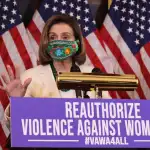As Congress reconvened on Wednesday evening after a mob attacked the U.S. Capitol, Gabby Giffords, a former House lawmaker herself, expressed public relief that her husband, Mark Kelly, a newly sworn-in Democratic senator from Arizona, was safe and accounted for.
“As I sat waiting for information about @SenMarkKelly’s safety today, I couldn’t stop thinking about what you must have gone through 10 years ago this week. I’m so glad you and your staff are safe. I love you, sweetie,” Giffords wrote on Twitter.
When the Donald Trump-backed insurrectionists invaded the Capitol, temporarily interrupting the certification of Joe Biden’s 2020 election victory, it was just two days before the 10th anniversary of an assasination attempt that nearly cost Giffords her life.
On January 8, 2011, just days after being sworn into her third House term, Giffords was meeting with constituents in a Tucson-area supermarket parking lot when a 22-year-old man with a semiautomatic pistol opened fire, killing six and injuring 13. Initial media reports said Giffords had died in the attack. In reality, a bullet had passed through her brain and, after a period in a medically-induced coma, she would begin an intense recovery process to relearn how to walk, read, write and speak.
Giffords, along with Kelly, would also spend the next decade becoming one of the most forceful advocates for passing gun safety legislation at the state and federal level by founding the advocacy organization now called Giffords.
“I made a decision, after some time, to step down from Congress, the best job I’d ever had, to focus on my recovery — that was painful,” Giffords said in a written interview.
“Then the [2012] shooting at Sandy Hook happened. I watched the images of those children being led out of the school. I think I was in shock at first. I could not believe such violence could happen to young students and their teachers. I told Mark we had to do something,” she added. “So I turned to the tool I know the best: using policy to solve problems.”
Read: The 19th’s full interview with Giffords here.
It has been more than 25 years since Congress has passed a major bill to curb gun violence that was signed into law — the Federal Assault Weapons ban by Democratic President Bill Clinton. But, even the 1994 law was written with a 10-year sunset provision, so it has since expired. There were several failed attempts to renew it, including by President Barack Obama in 2013 after the Sandy Hook shootings that left 20 young children and six staff members dead. All efforts derailed in the Republican-controlled Senate.
Now, with Biden in the White House and his party poised to control both chambers of Congress, advocates for gun safety laws believe action is on the horizon, in no small part thanks to Giffords’ tireless work in the halls where she was once known for her consensus-building skills.
Sen. Kirsten Gillibrand, a former Democratic presidential candidate who has worked on gun safety issues, called Giffords a “transformational leader and transformational advocate” who has “really changed the dialogue about gun safety in this country.”
“A decade of advocacy by Gabby and others will come to fruition in this Congress,” Gillibrand predicted in an interview conducted before the Wednesday siege on the Capitol building.
Advocates agree that the first proposal Congress will likely consider is a version of a background check bill that the House passed in 2019 that died when it got to the Senate, where Republican Majority Leader Mitch McConnell did not bring it up for a vote. A “red flag” bill giving courts the power to temporarily confiscate firearms from individuals deemed at risk or an anti-gun trafficking measure could follow.
Biden has also pledged to work with Congress to reauthorize the Violence Against Women Act (VAWA), which Biden worked on as a senator in the 1990s. In 2019, the House approved a VAWA provision to close the so-called “boyfriend loophole” that allows current and former unmarried partners convicted of abuse and stalking to continue to purchase firearms. That effort also stalled in the Senate.
Most all gun legislation would still require 60 votes in the 100-seat Senate to clear procedural hurdles. Given that the chamber will be split 50-50 between Republicans and Democrats with Vice President-elect Kamala Harris as the tie-breaking vote, it’s unclear what legislation will emerge from the upper chamber and make it onto Biden’s desk. But Democratic Sen. Chuck Schumer, who is poised to be majority leader, has promised to hold votes on gun safety bills, which will force Republican lawmakers to take a position.
“Those bills are not going to just silently sit on Mitch McConnell’s desk anymore,” said Shannon Watts, the founder of Moms Demand Action, a grassroots volunteer group working to reduce gun violence.
“Senators will have to put their names out there and vote against things that are overwhelmingly popular and anyone who stands in our way now would do so at their own political peril,” she added.
If Congress does not act, there are a number of executive actions that Giffords and other advocates would like to see Biden take to address gun violence, including an interagency task force and prioritization by the Justice Department.
Giffords’ imprint will likely be on any gun safety measure that is enacted in the coming months or years. She has also inspired a generation of young leaders and volunteers who came of age in a movement that is personal for many of them, where the work can be draining and include repeated setbacks.
“Gabby is tireless about this work and that’s how we all have to be about this work because it is never ending,” said Robin Lloyd, managing director of Giffords, the organization.
As Isabelle James, the former political director at Giffords, put it: “I know a lot of people really draw strength and inspiration from Gabby, the issue of violence is a tough one to work on, you get tired.”
Watts said Giffords’ impact extends beyond her staff to the thousands of volunteers that power Moms Demand Action.
“When Gabby speaks you could hear a pin drop because people are so enrapt in what she’s saying and admire her so greatly,” Watts said. “You need heroes to inspire you when you’re a volunteer doing work that can sometimes feel so hard, and so thankless, and so difficult, and you see Gabby doing this, even under the most stressful circumstances, and you realize: if she can do it, we can too.”





